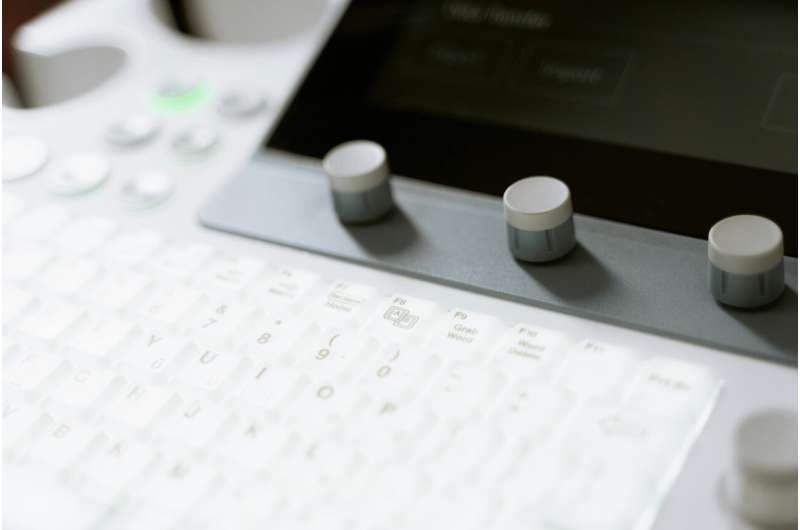
A big randomized trial confirmed no vital variations to show that utilizing synthetic intelligence (AI) to assist scientific decision-making in assessing coronary heart ultrasounds is as efficient as present apply at figuring out all-comers with suspected coronary heart illness who might profit from invasive investigation and remedy.
Nonetheless, the findings being introduced in a Sizzling Line Session at this 12 months’s ESC Congress 2024 in London, UK (30 Aug—2 Sept), confirmed that AI improved resolution making for less-experienced clinicians, and had promising ends in sure vital sub-groups which can be clinically complicated.
“Integration of AI into well being care holds nice promise as a device to assist medical professionals diagnose sufferers sooner and extra precisely, permitting them to begin remedy sooner,” mentioned lead creator Dr. Ross Upton from the College of Oxford, UK.
“Our giant, randomized trial involving sufferers with suspected coronary heart illness from throughout the UK didn’t present significant variations within the major finish level however suggests AI might profit resolution making for much less skilled clinicians and in situations the place the scientific analysis is tougher.”
Coronary artery illness (CAD) is answerable for over 9 million deaths worldwide, and 63,000 deaths yearly within the UK alone. Stress echocardiography (SE) is an ultrasound of the guts throughout relaxation and stress that determines threat of coronary heart assault and loss of life in sufferers with recognized or suspected CAD (blockages within the blood vessels supplying the guts).
SE is among the mostly used diagnostic imaging assessments for CAD, and the one imaging methodology extensively out there within the UK to diagnose CAD. Nonetheless, its accuracy varies extensively (from 60% to 94%) relying on the experience of the clinician assessing the scans and picture high quality.
Dr. Upton and Professor Paul Leeson developed the software program, referred to as EchoGo Professional, throughout Upton’s DPhil on the College of Oxford. The software program is designed to offer automated interpretation of SE pictures, by combining novel picture options with AI, nevertheless it has not been examined prospectively in a randomized managed trial.
To discover this, the PROTEUS randomized managed trial enrolled sufferers (aged 18 and older) who have been referred to SE clinics for investigation of suspected CAD at 20 hospitals throughout the UK between November 2021 and June 2023.
A complete of two,341 sufferers (common age 64 years; 45% feminine; 20% with preexisting coronary heart illness) have been randomly allotted in a 1:1 ratio to plain scientific resolution making (management) or AI-augmented resolution making, for which clinicians acquired an AI picture evaluation report (EchoGo Professional) to make use of throughout picture interpretation, indicating the chance of extreme CAD.
The first evaluation evaluated the appropriateness of ordinary scientific decision-making versus AI-augmented resolution making when deciding on sufferers for invasive coronary angiograms, and associated acute coronary occasions inside 6 months. By December 2023, 2,213 sufferers (94.5%) achieved 6months follow-up.
In complete, 85 sufferers have been referred for angiography after SE. Of these not referred, 41 sufferers skilled acute coronary syndrome (nonfatal coronary heart assault) or cardiac loss of life inside 6 months, suggesting an inappropriate resolution.
General, the analyses discovered that AI-assisted resolution making didn’t show non-inferiority versus scientific resolution making for appropriately deciding on sufferers for coronary angiography. Of these despatched for angiography 27 out of 36 referrals have been appropriate within the management arm and 34 out of 49 referrals have been appropriate within the AI arm.
Of the sufferers that ought to have been despatched for an angiogram who subsequently skilled an occasion, there have been 22 within the management group and 19 within the AI group, however the distinction was not statistically vital.
Nonetheless, additional analyses discovered that AI might profit scientific decision-making in much less skilled clinicians and in vital sub-groups whose pictures are recognized to be harder to interpret.
“It’s effectively reported that clinician efficiency in decoding stress echocardiograms ranges extensively based on the expertise degree of the operator” defined Dr. Upton. “The outcomes of this trial recommend that AI has the potential to deliver all operators, no matter expertise, as much as the identical degree of accuracy.”
He added, “Whereas the PROTEUS trial didn’t show significant variations in all-comers, the AI diagnostic may additionally profit particular subgroups of sufferers in whom resolution making is thought to be extra complicated.”
Quotation:
Massive trial suggests AI for coronary heart scans might profit resolution making for less-experienced clinicians (2024, September 2)
retrieved 2 September 2024
from https://medicalxpress.com/information/2024-09-large-trial-ai-heart-scans.html
This doc is topic to copyright. Aside from any truthful dealing for the aim of personal research or analysis, no
half could also be reproduced with out the written permission. The content material is supplied for data functions solely.
